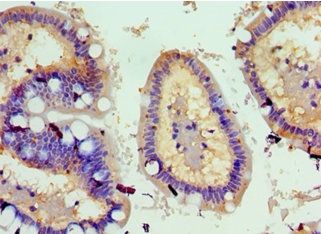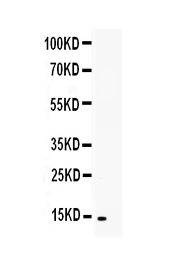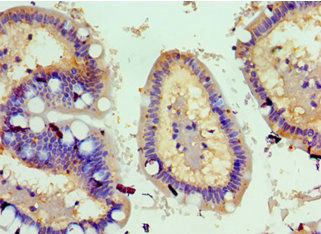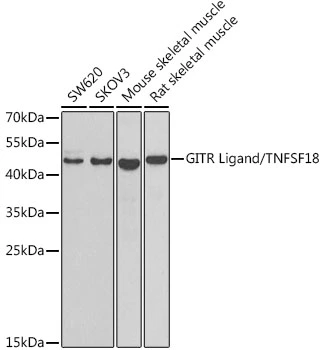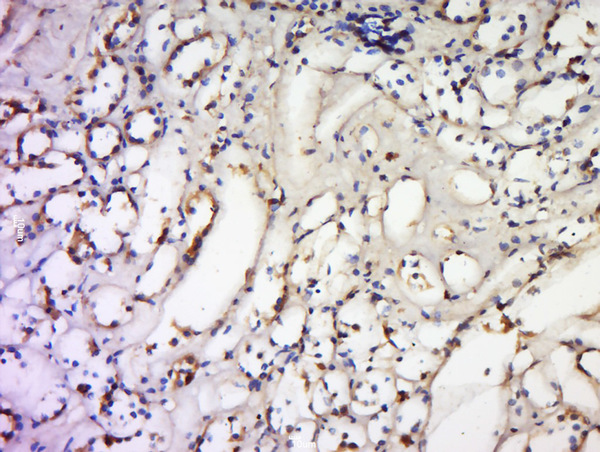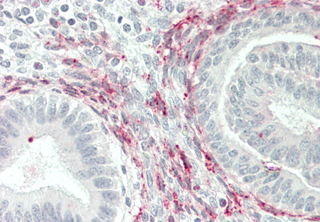
Immunohistochemical staining of GITRL using anti-GITRL (human), pAb (Prod. No. AG-25A-0023) in human uterus tissue (5microg/ml). This antibody has been tested in immunohistochemistry, analyzed by an anatomic pathologist and validated for use in IH
anti-GITRL (human), pAb
AG-25A-0023
ApplicationsWestern Blot, ELISA, ImmunoHistoChemistry
Product group Antibodies
ReactivityHuman
TargetTNFSF18
Overview
- SupplierAdipoGen Life Sciences
- Product Nameanti-GITRL (human), pAb
- Delivery Days Customer10
- ApplicationsWestern Blot, ELISA, ImmunoHistoChemistry
- CertificationResearch Use Only
- ClonalityPolyclonal
- Concentration1 mg/ml
- Gene ID8995
- Target nameTNFSF18
- Target descriptionTNF superfamily member 18
- Target synonymsAITRL, GITRL, TL6, TNLG2A, hGITRL, tumor necrosis factor ligand superfamily member 18, AITR ligand, GITR ligand, activation-inducible TNF-related ligand, glucocorticoid-induced TNF-related ligand, glucocorticoid-induced TNFR-related protein ligand, tumor necrosis factor (ligand) superfamily, member 18, tumor necrosis factor ligand 2A, tumor necrosis factor superfamily member 18
- HostRabbit
- Protein IDQ9UNG2
- Protein NameTumor necrosis factor ligand superfamily member 18
- Scientific DescriptionGITRL is expressed on dendritic cells (DC), monocytes, macrophages, B cells, activated T cells, endothelial cells, osteoclasts and various healthy non-lymphoid tissues (e.g. testis, ..). GITRL is constitutively expressed and released as soluble form by solid tumors and various hematopoietic malignancies. GITRL causes differentiation of osteoclasts, activation of macrophages, but also alteration of carcinoma and leukemia cells and influences apoptosis. Binding to GITR is important in regulating T-cell proliferation and TCR-mediated apoptosis. GITRL is implicated in development of autoimmune diseases and in the immune response against infectious pathogens and tumors. - Polyclonal Antibody. Recognizes human GITRL. Detects a band of ~15-17kDa by Western blot. Does not cross-react with mouse GITRL. Source: Rabbit. Applications: ELISA, IHC, WB. Liquid. 0.2microm-filtered solution in PBS, pH 7.4. Contains no preservatives. GITRL is expressed on dendritic cells (DC), monocytes, macrophages, B cells, activated T cells, endothelial cells, osteoclasts and various healthy non-lymphoid tissues (e.g. testis, .). GITRL is constitutively expressed and released as soluble form by solid tumors and various hematopoietic malignancies. GITRL causes differentiation of osteoclasts, activation of macrophages, but also alteration of carcinoma and leukemia cells and influences apoptosis. Binding to GITR is important in regulating T-cell proliferation and TCR-mediated apoptosis. GITRL is implicated in development of autoimmune diseases and in the immune response against infectious pathogens and tumors.
- ReactivityHuman
- Storage Instruction-20°C,2°C to 8°C
- UNSPSC41116161

